In mid-February, a Reforest'Action team went to Tanzania to carry out an audit of our reforestation project. The objective of this mission? To exchange with our local partner Friends of Usambara, to monitor the trees already planted in the field, to record environmental, economic and social indicators, and to meet the local communities to continue to develop our project alongside them.
Meet our partner in the field
Lushoto. After the overwhelming heat of the Maasai plains crossed on our way from Dar Es Salaam, it is a breath of fresh air that welcomes us, in the hollow of a green valley, at 1200 meters of altitude. Caroline, in charge of our international projects, and myself, in charge of reporting on the field, are welcomed by the team of our local partner, Friends of Usambara. This NGO, founded in Lushoto, specializes in reforestation, sustainable tourism and school environmental education programs - a young and generous team, experienced in setting up and deploying reforestation programs in the heart of the Usambara Mountains. Since their creation in 2008, they have already planted 22 million trees. This achievement makes them the main contributor to the massive effort to conserve the region's plant and animal biodiversity.
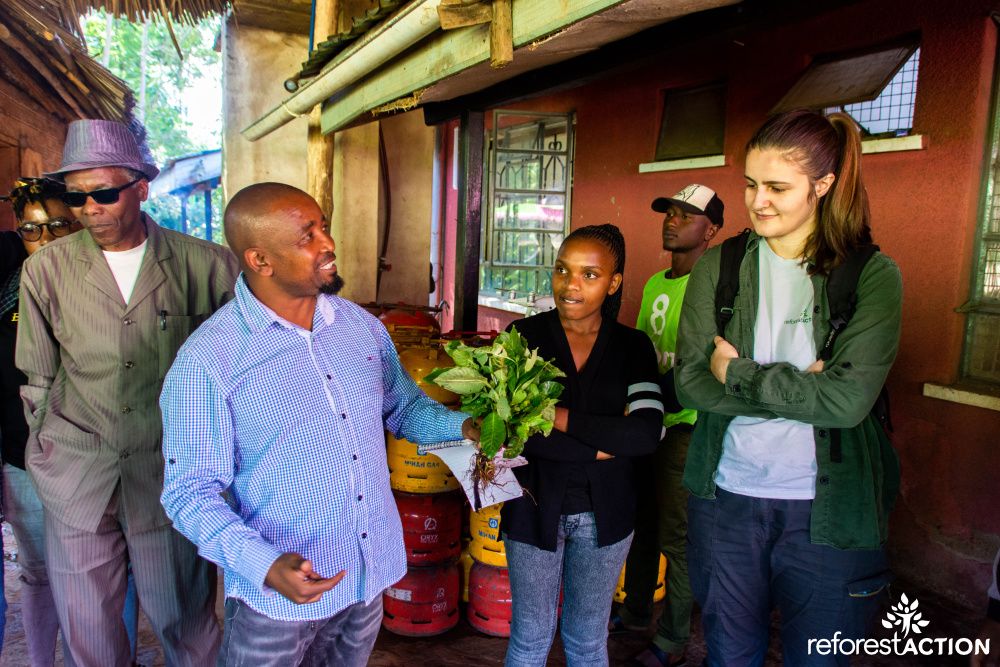
The offices of our partner Friends of Usambara are anchored at the entrance of the main nursery.
At the edge of the mother nursery that supplies the NGO with seedlings throughout the year, the 11 members of Friends of Usambara are gathered to welcome us in the coolness of their offices. Every day, during the rainy season, they roam the Magamba Reserve from one planting site to another, coordinating tree planting and identifying new areas for reforestation. Protected by the Tanzanian government since March 2016, the reserve covers 9,283 hectares, but signs of deforestation are still clearly visible in the landscape. These include the expansion of agricultural and grazing land at the expense of forests, and cutting for charcoal and fuelwood production.
Here, soil erosion is a tragedy for the environment and for the people. Under the pressure of rainwater, the soil disintegrates and becomes sterile, creating landslides and making cultivation impossible. Roads are lined with gigantic rocks that have fallen from the mountains. "We are planting on the mountainside to hold the soil and prevent the rocks from falling," says Madawa, the technical advisor of the reforestation programme at Friends of Usambara.
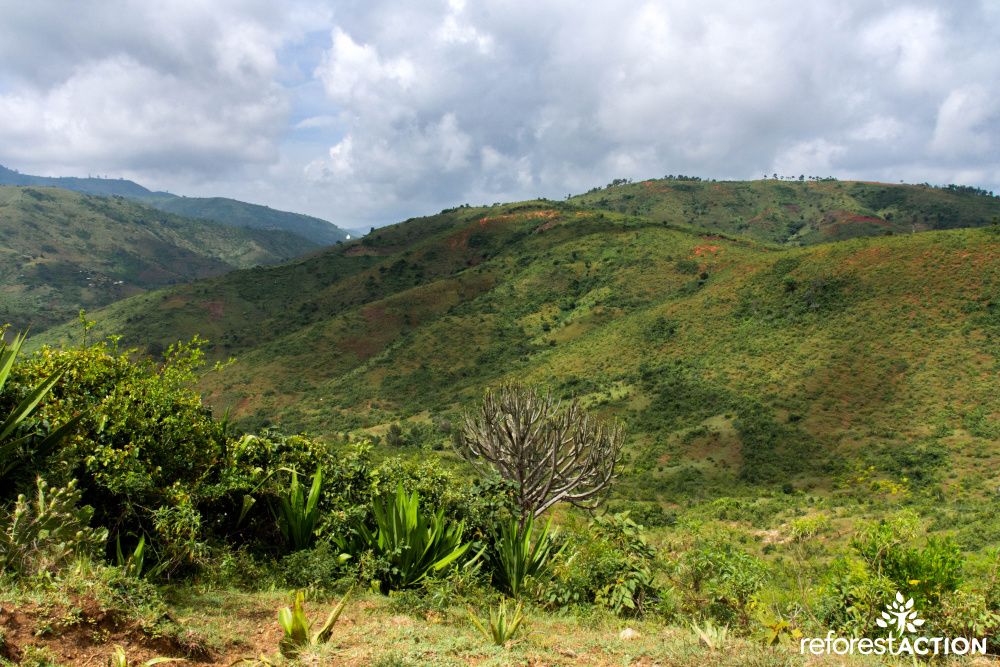
This hill bears the marks of erosion caused by deforestation.
Thanks to funding from our corporate partners and our community of Reforest'Actors, 1 million more trees will take root this year in the heart of the Usambara Mountains. Since September 2019 and the initiation of our partnership, nearly 630,000 trees have already been planted. The remaining 370,000 seedlings will be planted by July and the end of the rainy season.
Nurseries as far as the eye can see
After a time of exchange with Yassin, the founder of the NGO, we follow Issa, the tree nurseries coordinator, through the maze of the mother nursery. The fresh morning air rustles with the music of butterfly wings and the flow of the stream that meanders through the open-air nursery. A veritable Garden of Eden opens up to us, populated by a multitude of tree species, 90% of which are of indigenous origin. Erythrina Abycinia, Markhamia Lutea, Podocapus Usambarensis, Cedrela Odorata... So many species whose Latin and Swahili names, inscribed on signs, serve as landmarks in this ocean of greenery, where we move from one deck to another, crossing the stream, amidst the trumpets of the ipomea and bougainvillea.
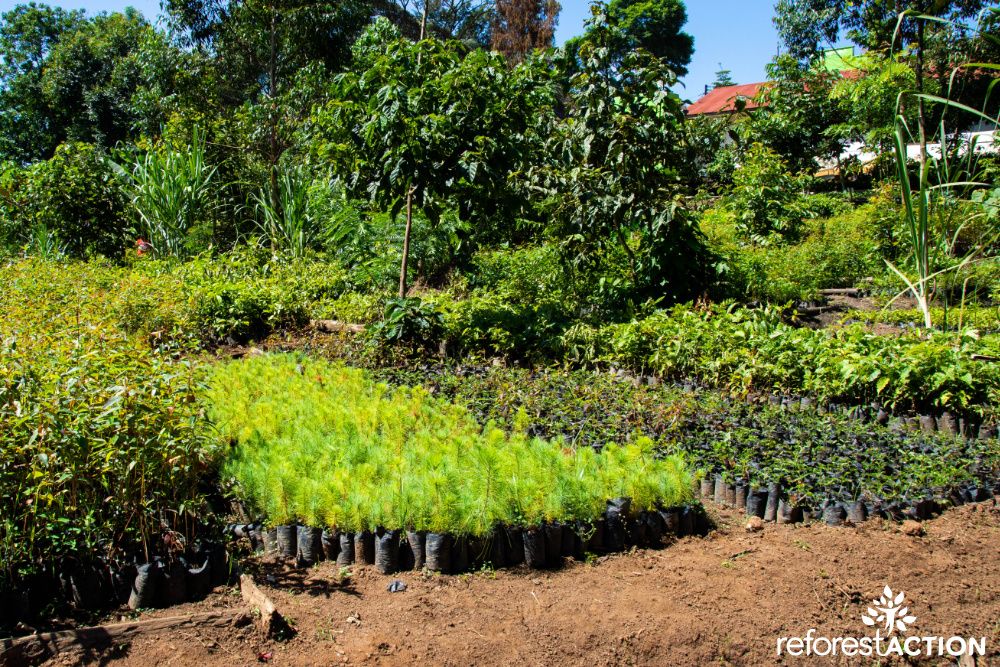
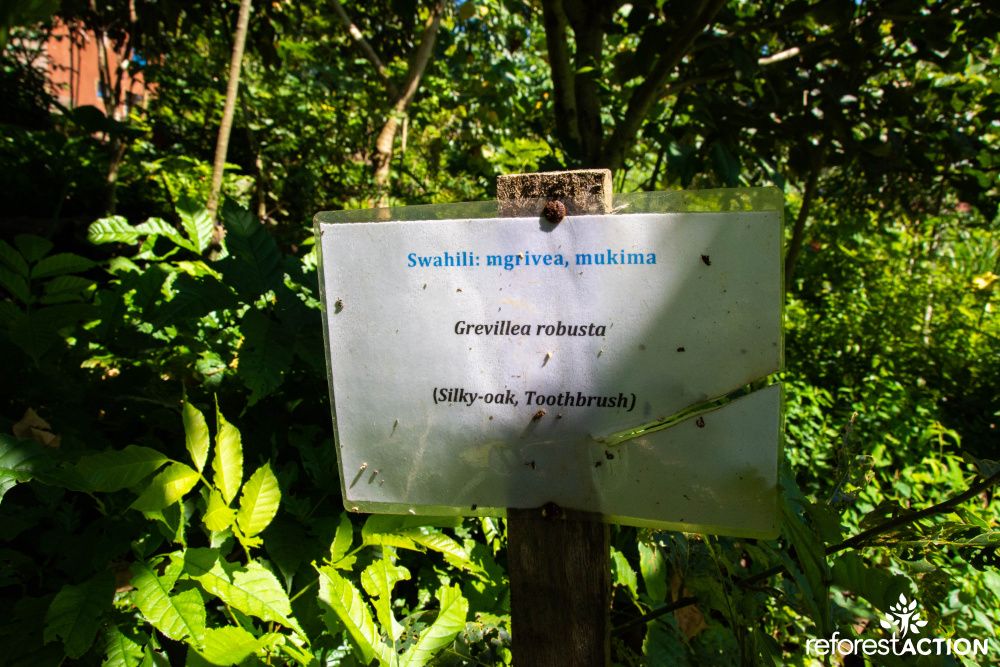
Issa explains the different techniques used by Friends of Usambara to produce the young trees. The NGO obtains seeds from the Tree Seedling Agency, a government entity, which are sown directly in the nurseries. Thanks to the know-how of the NGO and the nurserymen and women, the germination rate is excellent: 95% of the seeds planted or sown in tubes come out of the ground. The seedlings only need 3 to 4 months to reach a stage of maturity suitable for transplanting. Seedlings are also harvested directly from the surrounding forests in order to obtain the greatest possible genetic diversity. They are then placed in polythene tubes for 6 weeks before being replanted on the field.
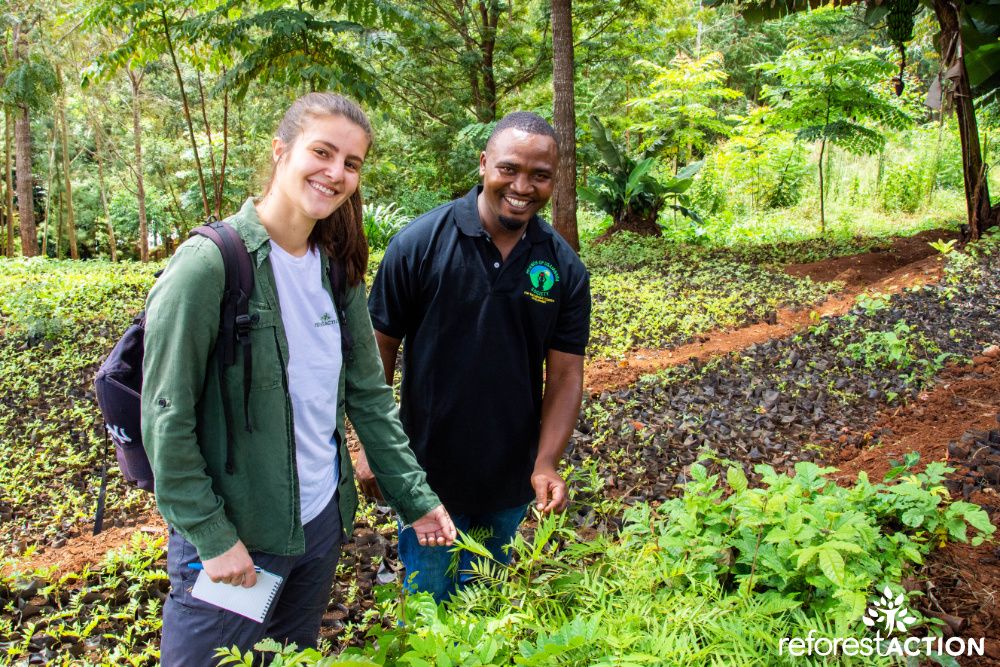
Issa from Friends of Usambara and Caroline from Reforest'Action talk about tree care in nurseries
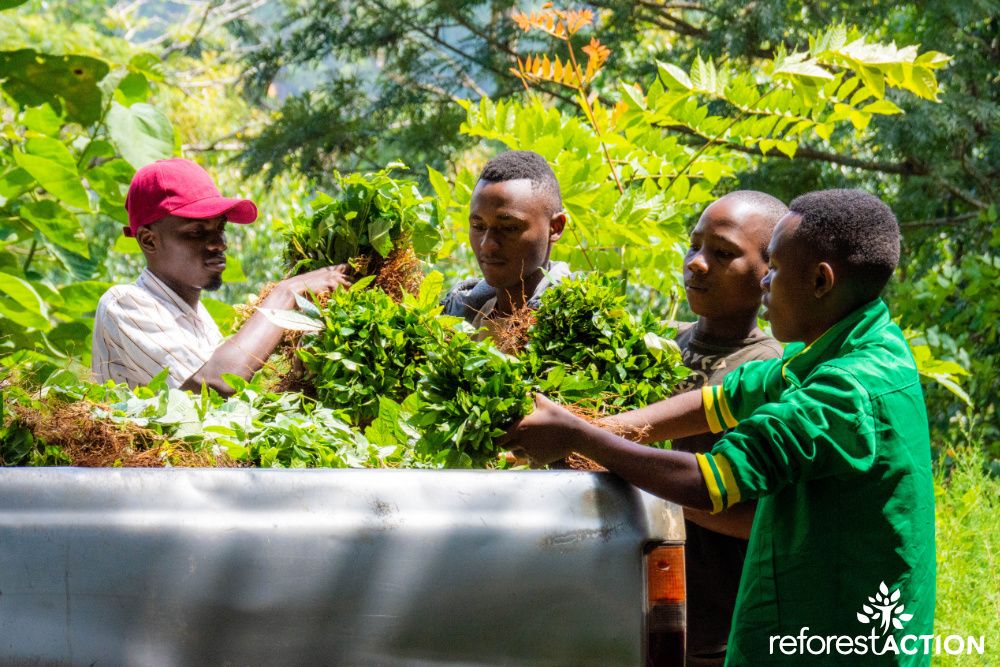
Loaded into the trailer of a truck, these young shoots come directly from the forests of Magamba. They will find in the nurseries the best possible conditions for their growth.
In the middle of the treebeds, or sheltered by a wooden roof against the equatorial sun, women take care of watering the plants or bagging the seedlings. Thanks to the work of 40 people, most of them women, the three nurseries associated with the project will eventually produce 30 million trees.
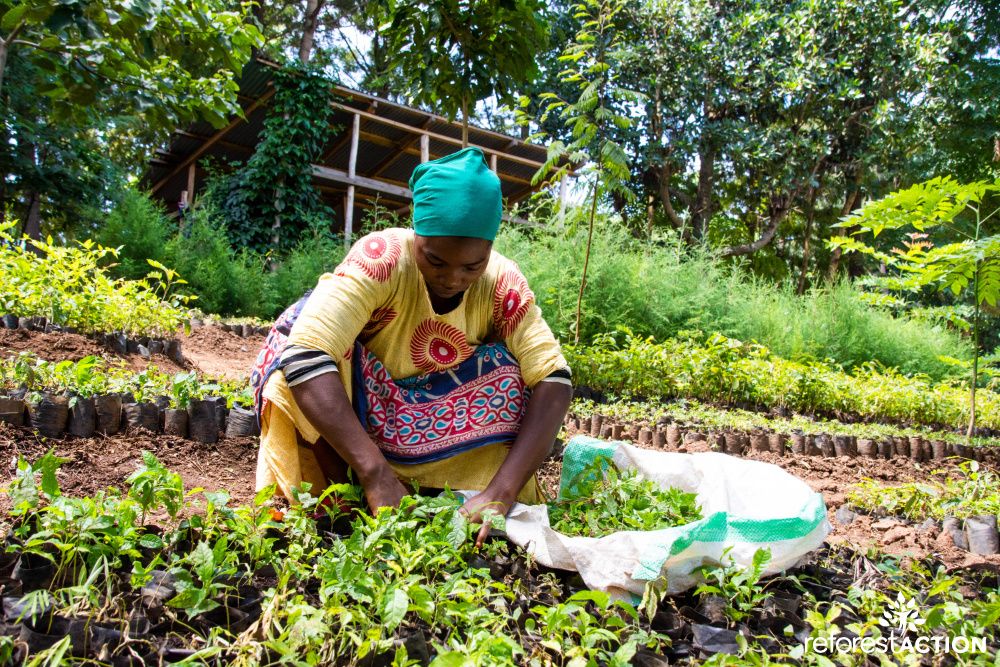
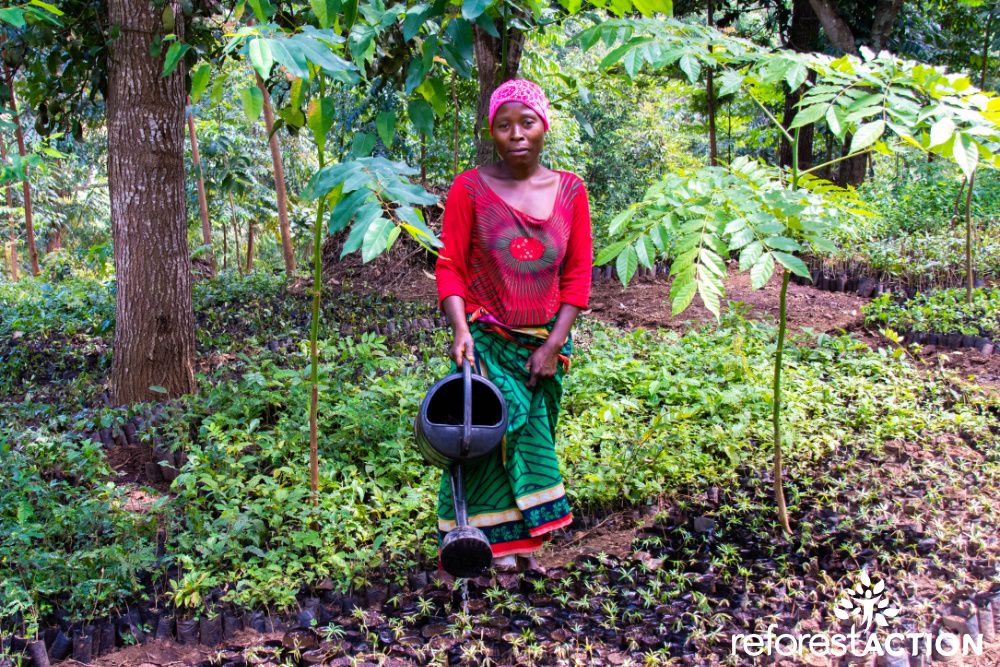
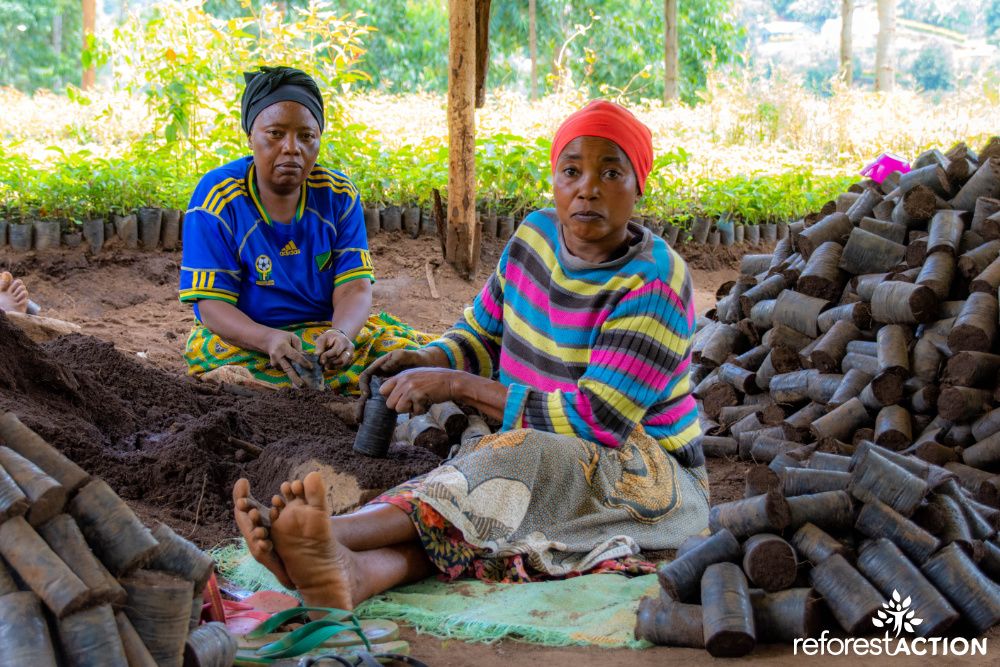
Putting seedlings in tubes, watering flowerbeds... So many tasks accomplished on a daily basis by the 40 nurserymen associated with the project.
Train schoolchildren to protect the environment
After this bath of greenery, we continue the road to the Mhelo Primary School, where a micro-nursery, financed by Reforest'Action, has been installed by our partner. Under the aegis of their teachers, the schoolchildren, all dressed in blue, are waiting for us at the top of a rocky promontory, which overlooks the plains to the horizon and offers us a breathtaking view of the Kambé mountain.
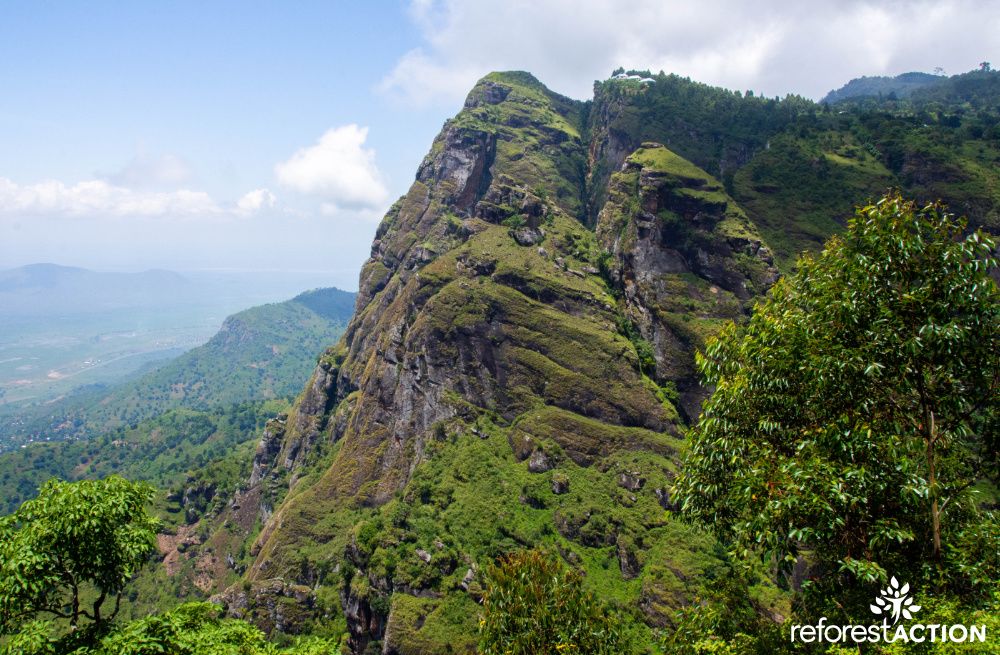
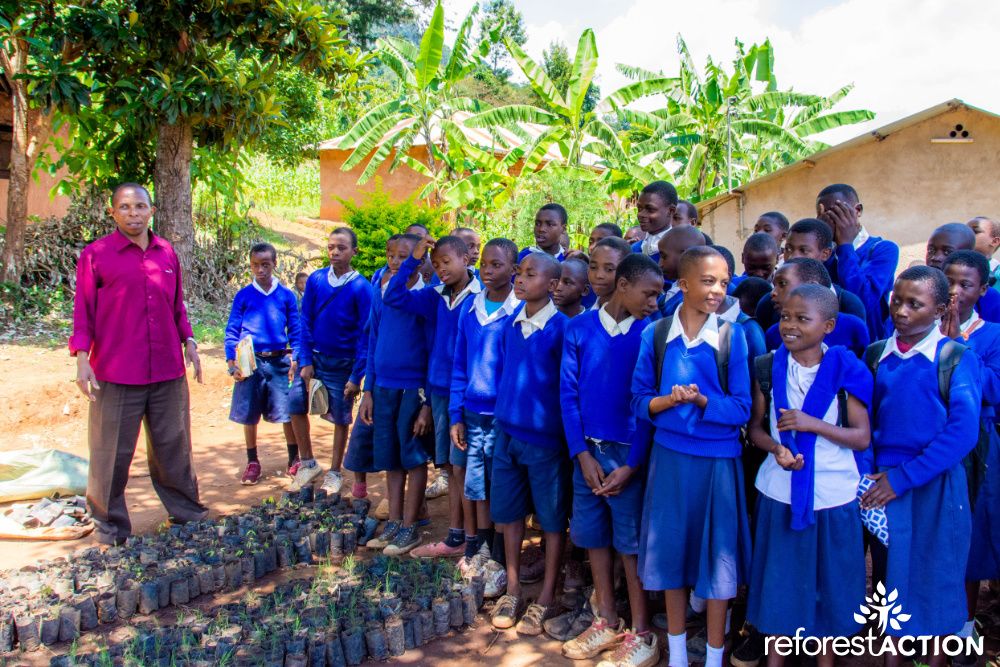
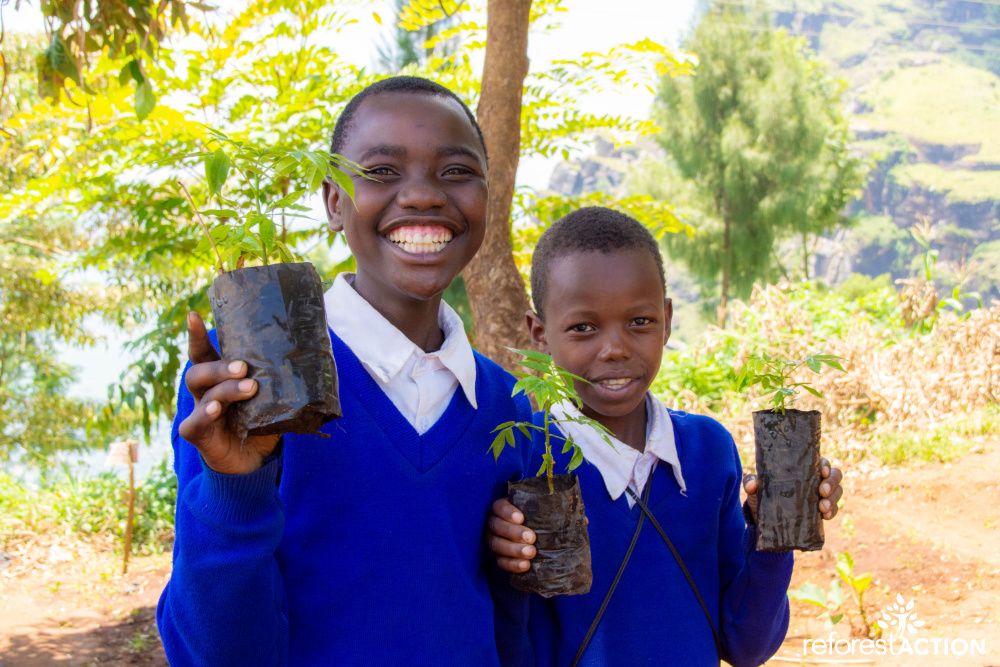
A total of 395 schoolchildren in 6 schools in the Lushoto region receive technical training in the creation and maintenance of a nursery, provided by Friends of Usambara. The objective? To create true ambassadors of the forest from a very young age, by raising awareness among schoolchildren of the importance of environmental conservation and the benefits of trees. These micro-nurseries will eventually produce 5,000 seedlings per school, or 30,000 trees in total. The young shoots will then be planted around the schools, or brought home by the children to take root in agroforestry in their parents' fields.
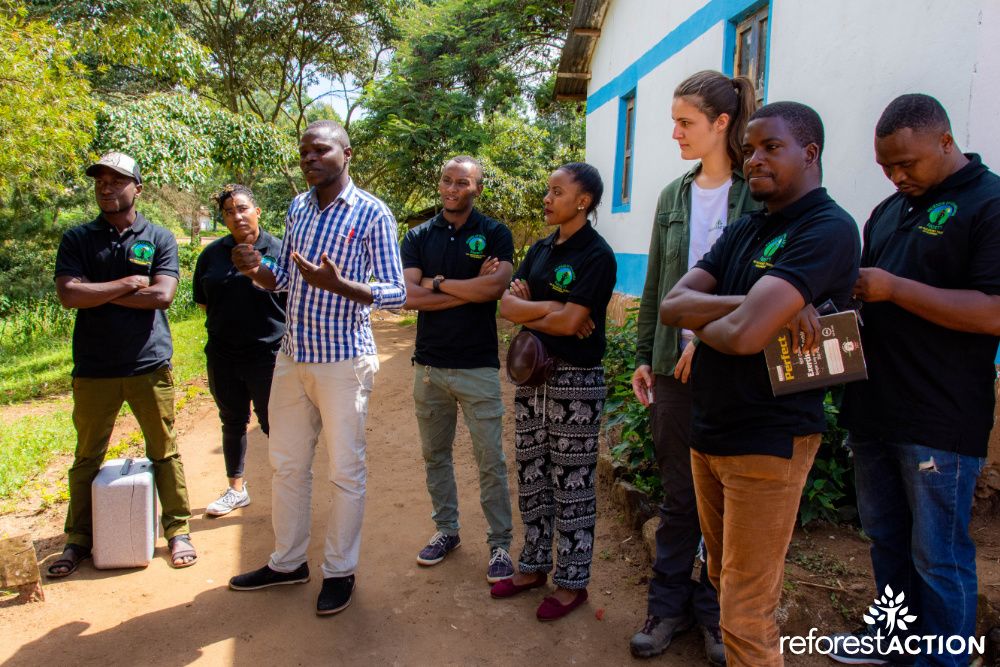
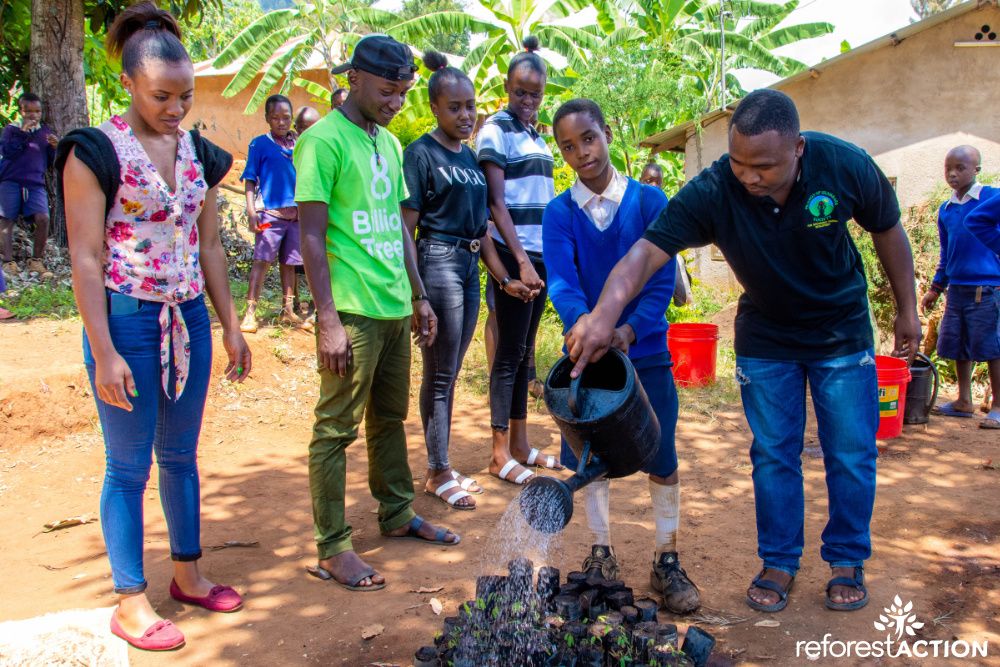
Thanks to the expertise of Friends of Usambara, schoolchildren are trained to maintain a nursery and protect forests.
We are experimenting with our first Swahili words with the schoolchildren, who are showing us their willingness to plant thousands of trees and open their own nursery when they are older. Our visit ends with the singing of an ode to nature by the children, who celebrate their forests with all the light and colour of Swahili.

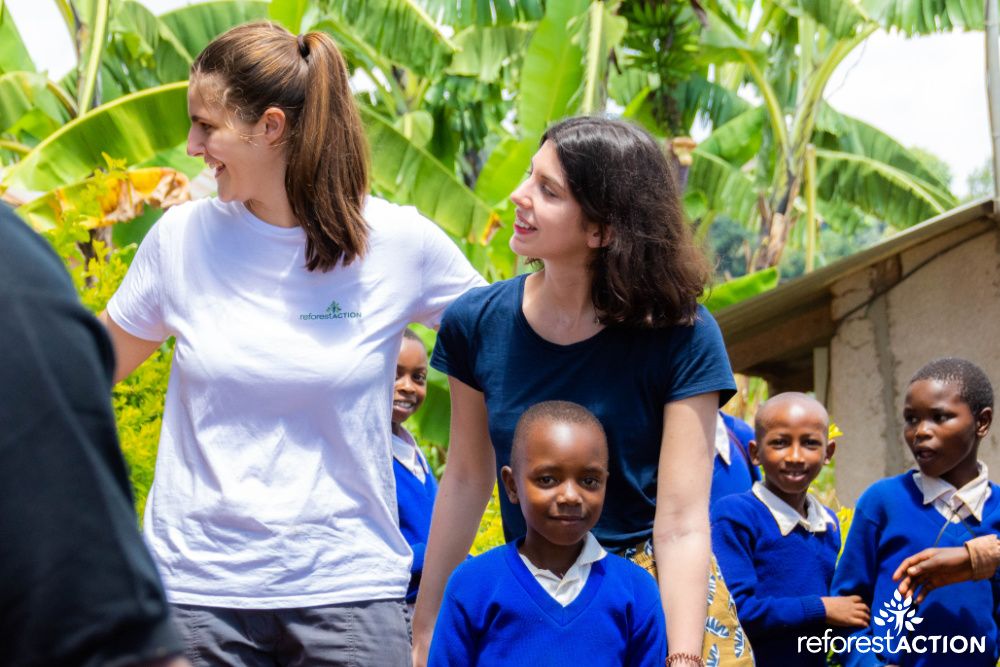
Get the local communities involved through agroforestry
The next day, we head to Malibwi to discover another part of our project. There, in this small village in the Lushoto region, we are welcomed by Janeth and her husband Frank Mlwati. Thanks to funding from Reforest'Action and the technical coordination of our local partner Friends of Usambara, they were able to plant 350 trees of various species, including avocado and Nile tulip tree, in their maize field.
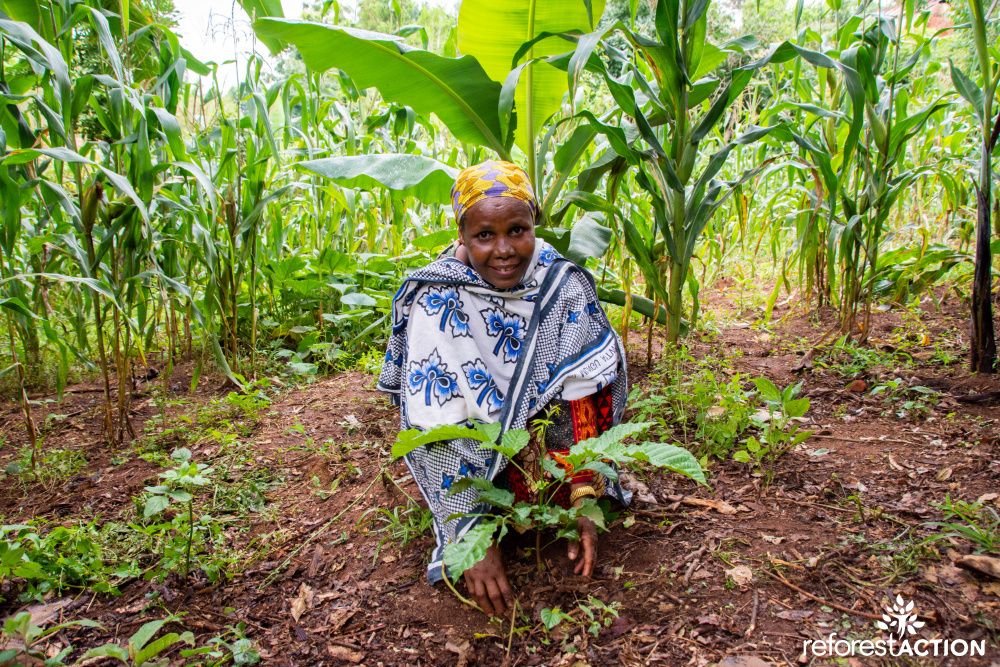
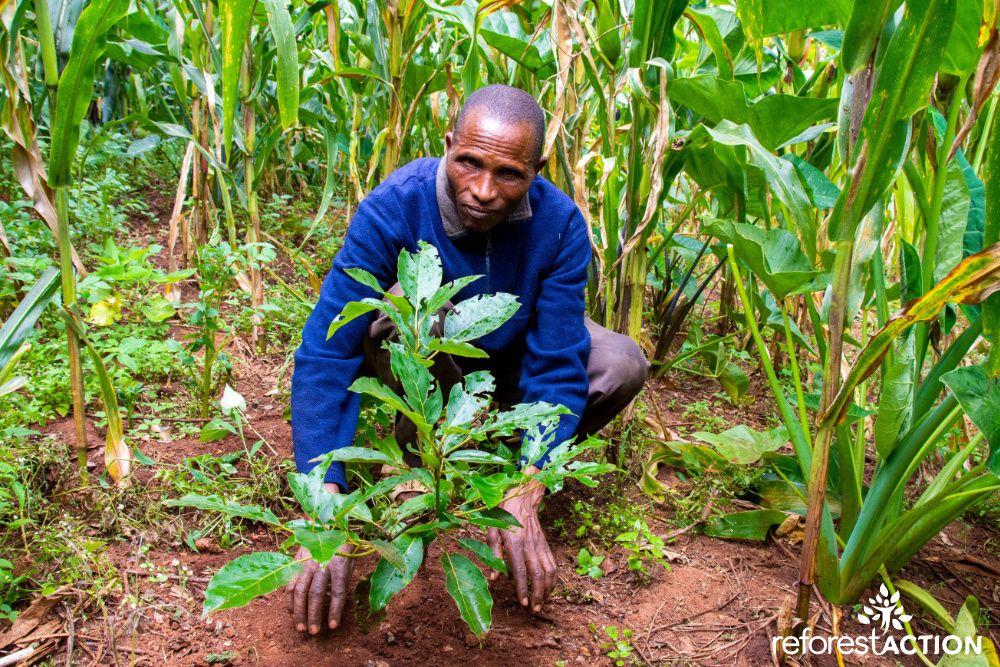
This practice, known as agroforestry, involves integrating trees into agricultural plots to improve soil quality, limit erosion and increase crop yields, while making agriculture more sustainable. It also diversifies the products harvested and improves the social, economic and environmental conditions of farmers. "One avocado tree can produce up to 9,000 avocados per year," says Issa. "Prior to the development of this project, Janeth and Frank could only rely on the cultivation of a single crop, maize. Now they have a solution to diversify their income and protect their crops." A valuable solution for this household, whose maize harvest is now dependent on the vagaries of climate change.
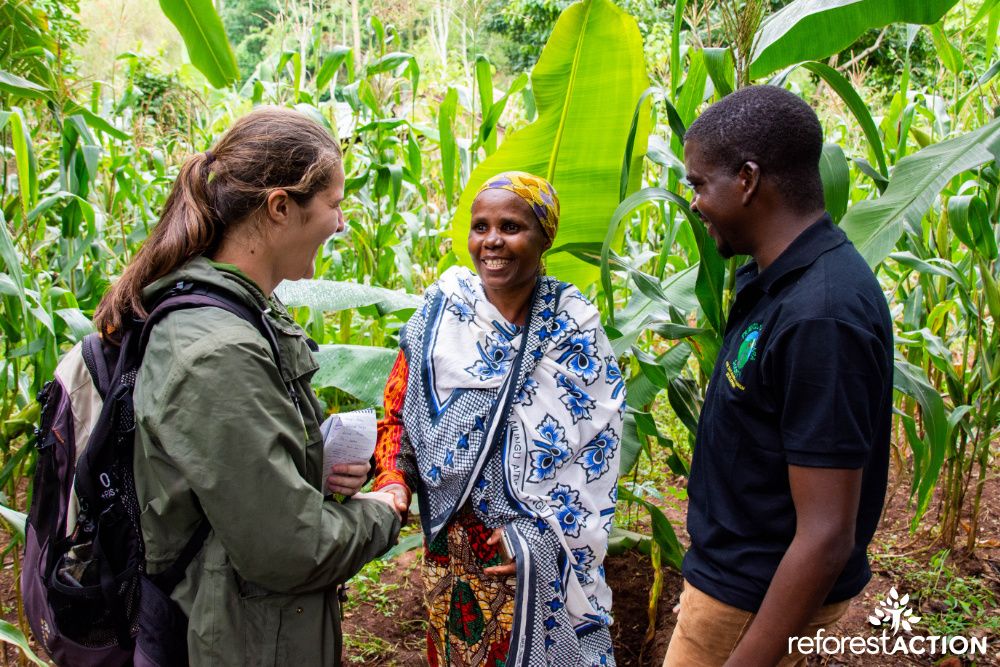
Exchange time between Caroline from Reforest'Action, Madawa from Friends of Usambara and Janeth from Malibwi village.
Like Janeth and Frank, 200 farmers in 9 villages in the Lushoto region will benefit from this programme. A total of 82,000 trees will take root in agroforestry this year thanks to our funding.
Reforesting the Usambara Mountains, one of the world's biodiversity hotspots
The final component of our project in Tanzania is the restoration of the mountains, which have suffered from severe deforestation over the past 40 years. Classified as one of the world's 35 biodiversity hotspots, this ecosystem is home to many endemic plant and animal species, such as the West Usambara two-horned chameleon, whose sunbathing we were able to observe at the bend in our path.
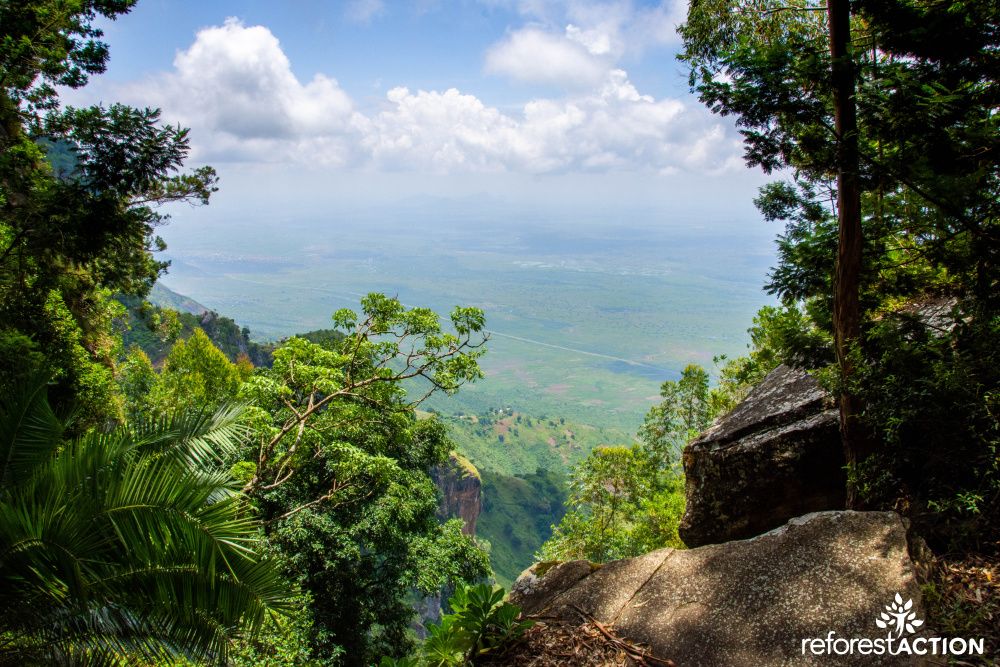
Forty years ago, this plain was covered with forests. It is to preserve what remains of this natural heritage that we are replanting trees...
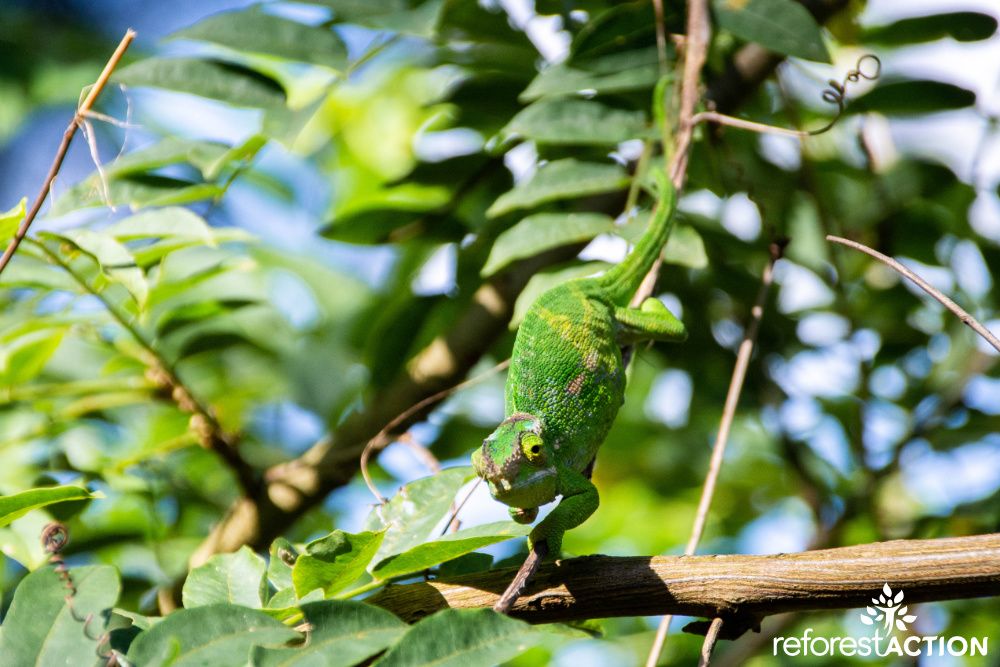
West Usambara two-horned chameleon, one of the endemic species of the region.
On the heights of the village of Malibwi, 518,000 trees financed by Reforest'Action will take root by the end of the planting season. A steep walk takes us to the plantations perched at the top of the mountain, where Caroline measured the recovery rate of the trees planted since September. The results are excellent: 95% of the plants have survived the first six months after planting.
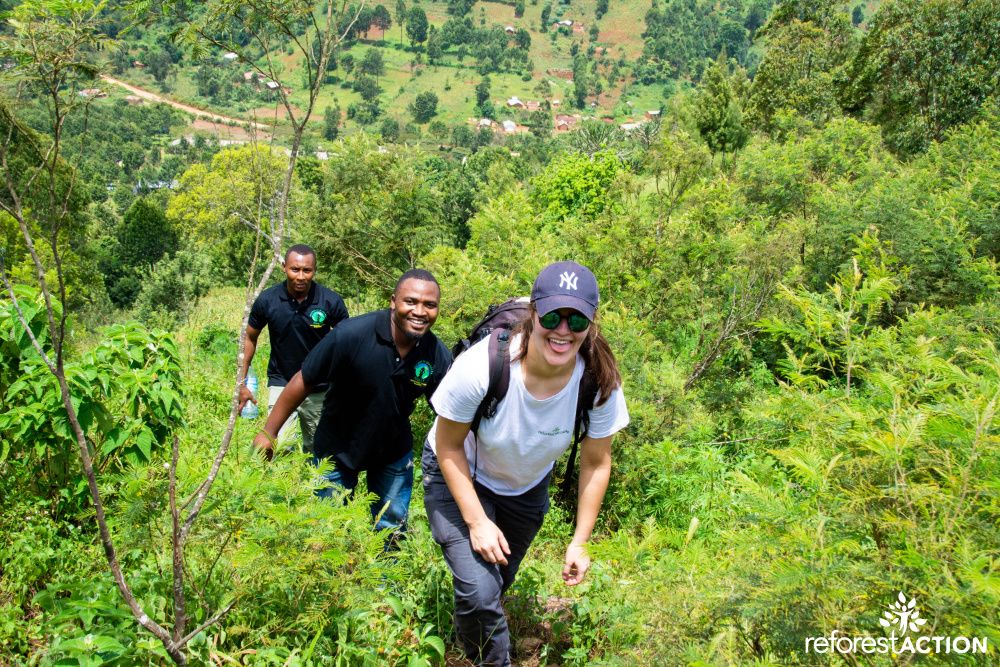
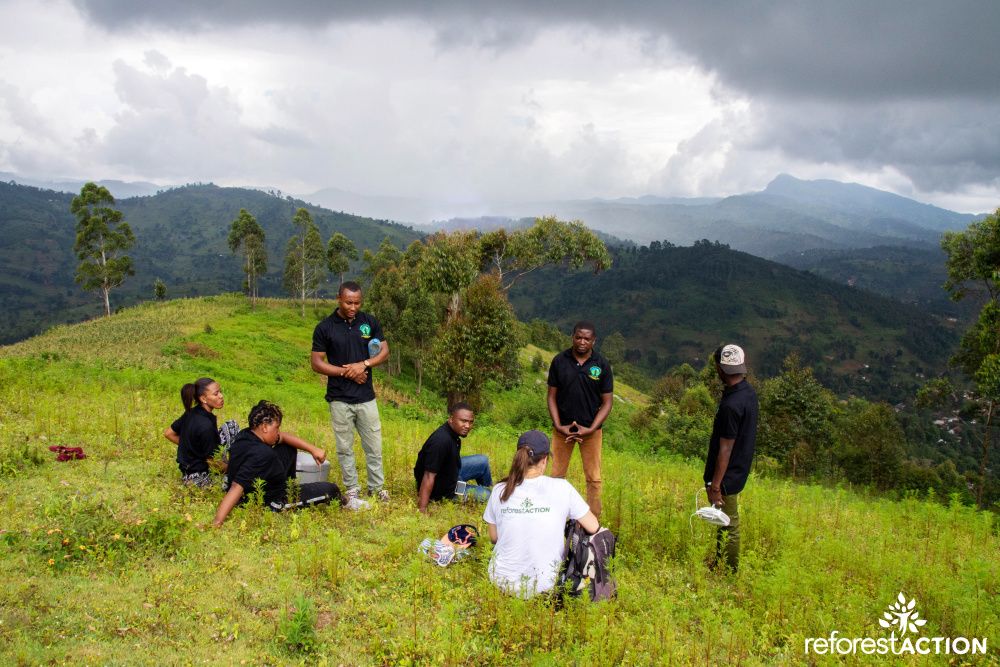
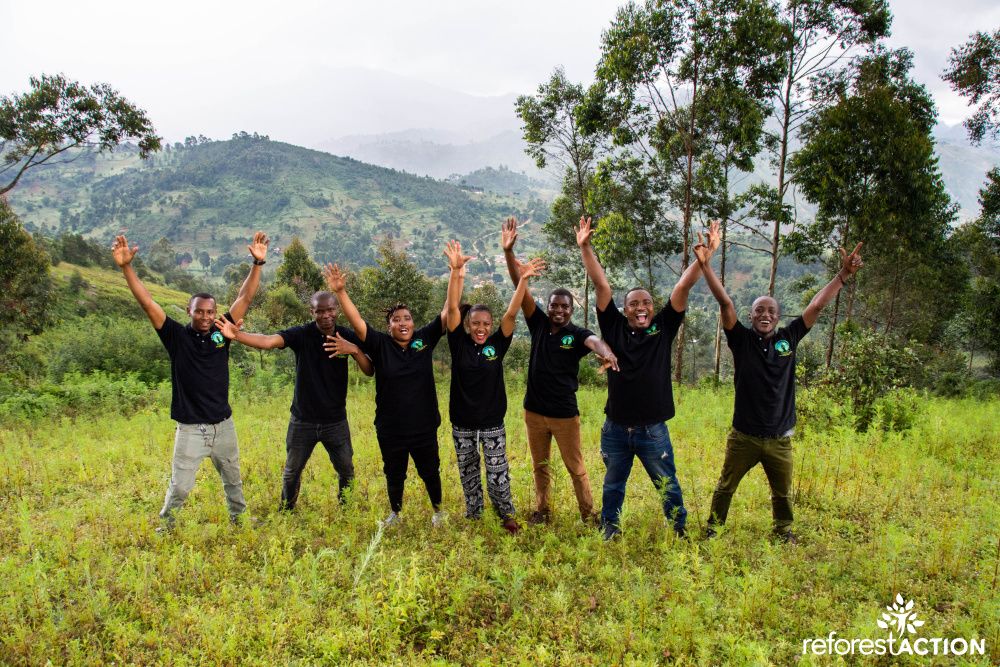
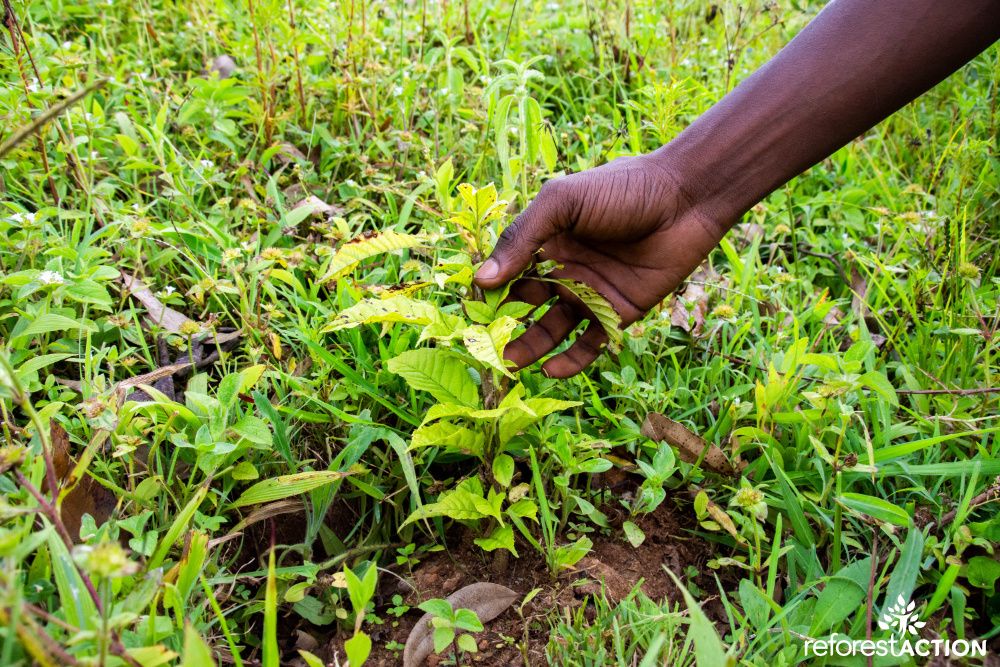
The next day, a real hive of activity awaits us in the village of Chambogo. Men and women are gathered to unload the plants from the nurseries. Representatives of the surrounding villages are also present. "The water sources that feed our villages come from these mountains," says Omari Kabwe, the Village Executive Officer from the neighbouring village of Makose. "If these reforestation efforts are not sustained, there is a good chance that we will experience many droughts, which will lead to increased food insecurity for the villagers."
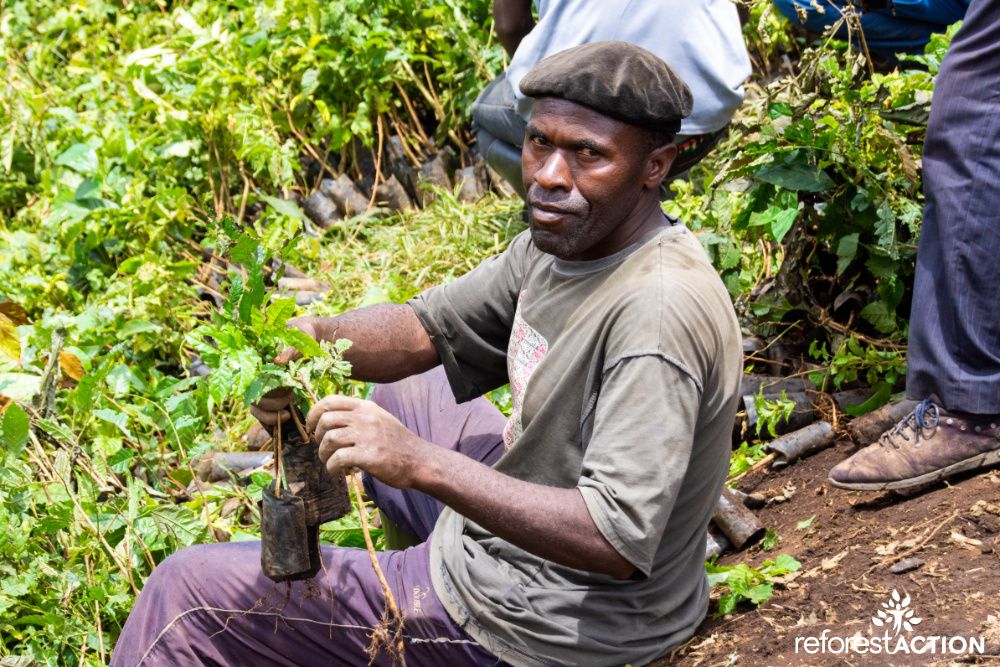
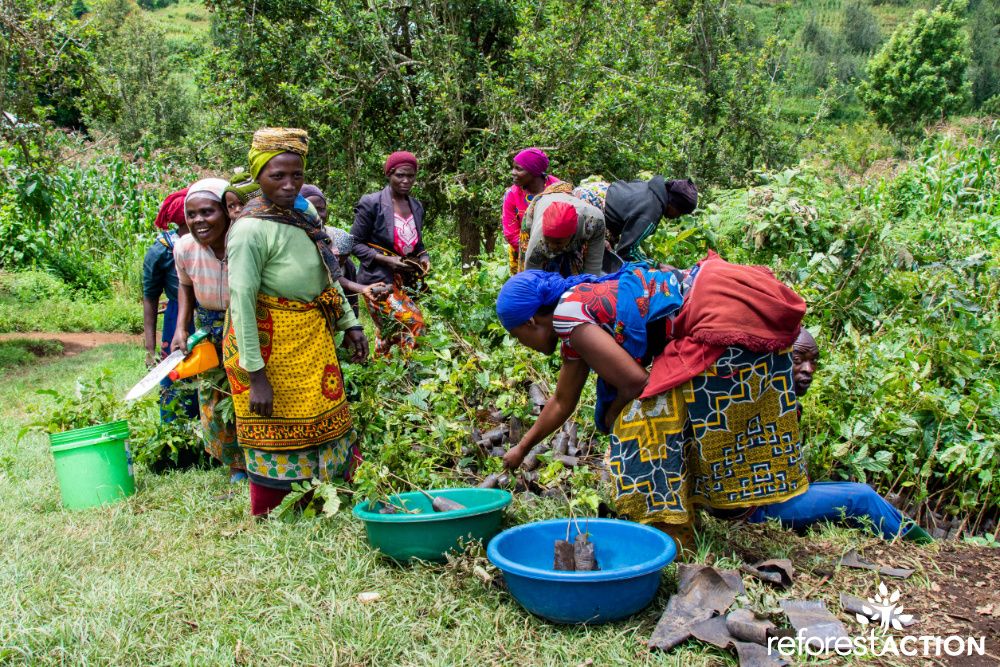
In the village of Chambogo, local communities prepare the trees that will be planted on the mountain.
Around us, the women are getting ready to climb the mountain, dressed in a loincloth and a blanket on their shoulders, sandals on their feet, a basin full of young shoots on their heads. We set off with them, along an increasingly steep path. At our feet, the valley spreads out its terraced crops and the thick foliage of banana trees under the storm clouds. The contours of the small red earthen houses with white roofs become smaller as we climb higher. The summit awaits us, where the local communities have already started planting.
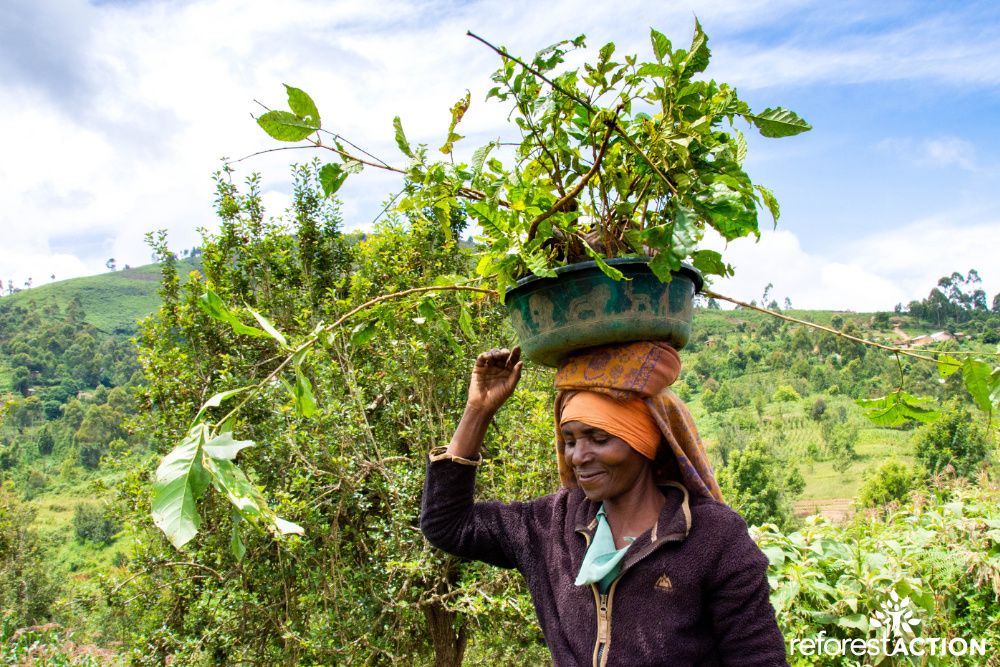
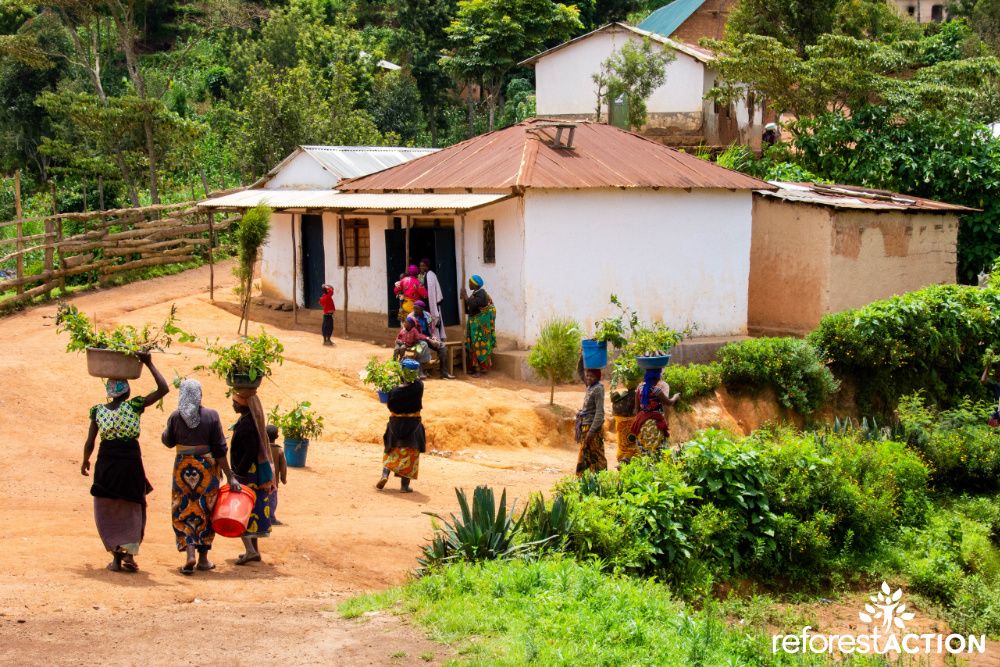
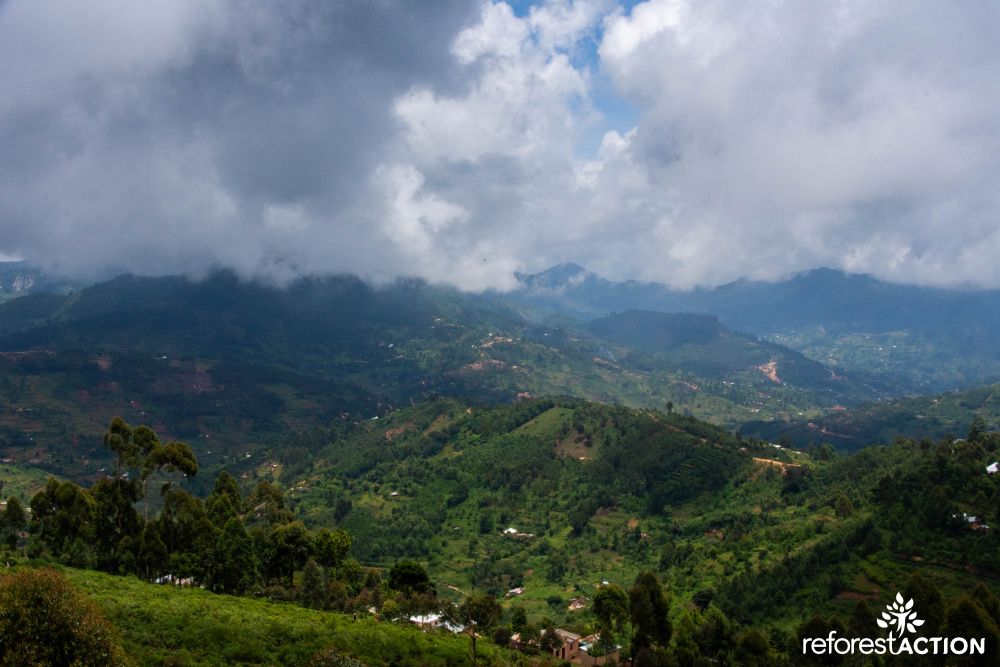
Here, 370,000 trees will cover the mountainside, at an altitude of over 2,000 metres. Among them are ficus, mahogany cedars, silky oaks and African tulip trees, which will help regenerate the soil and restore the forest cover that populated it just a few decades ago.
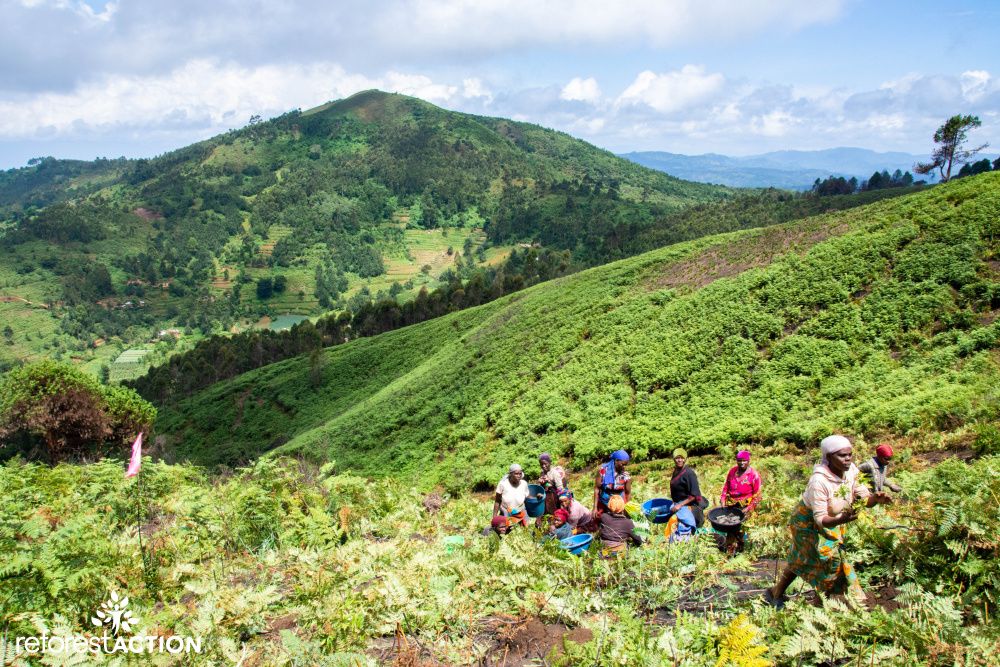
It's a real team effort: the men clear the ground with machetes and dig the holes that will receive the trees, while the women start planting with communicative energy. Planting takes place all morning, under the changing mountain skies.
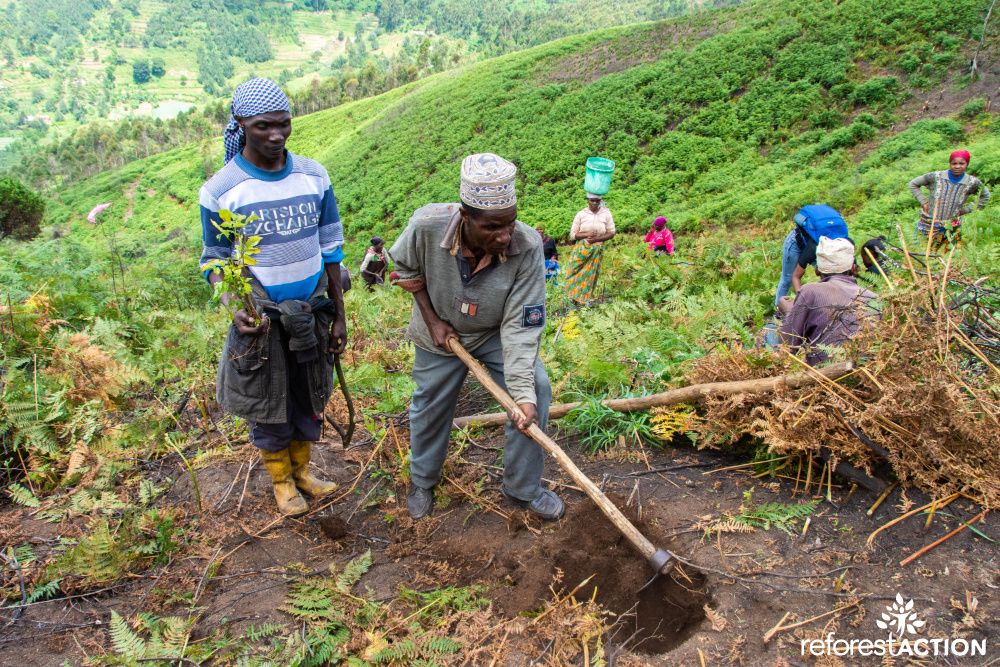
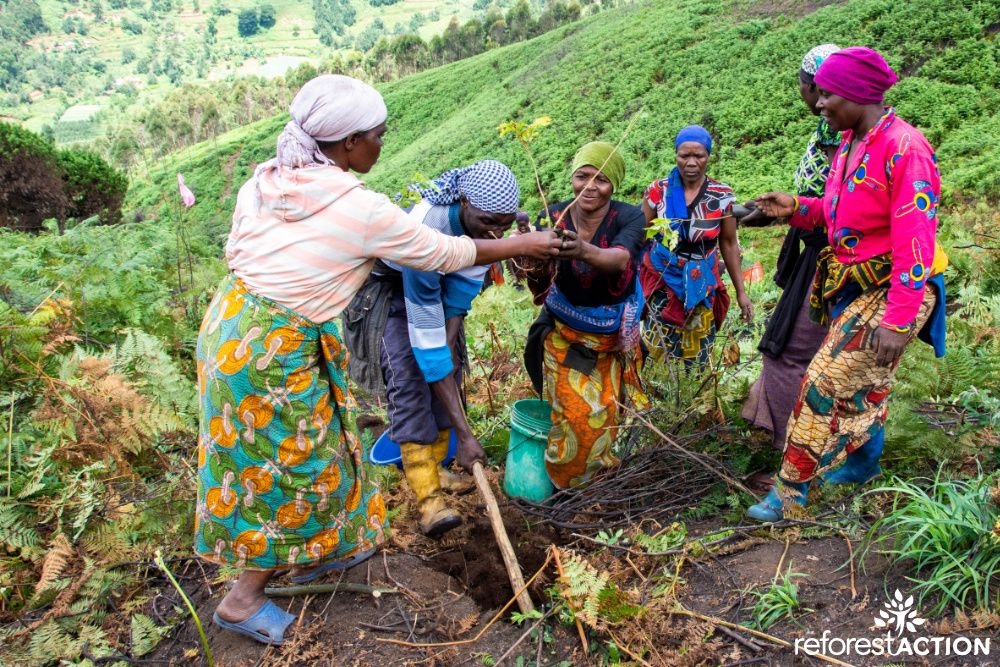
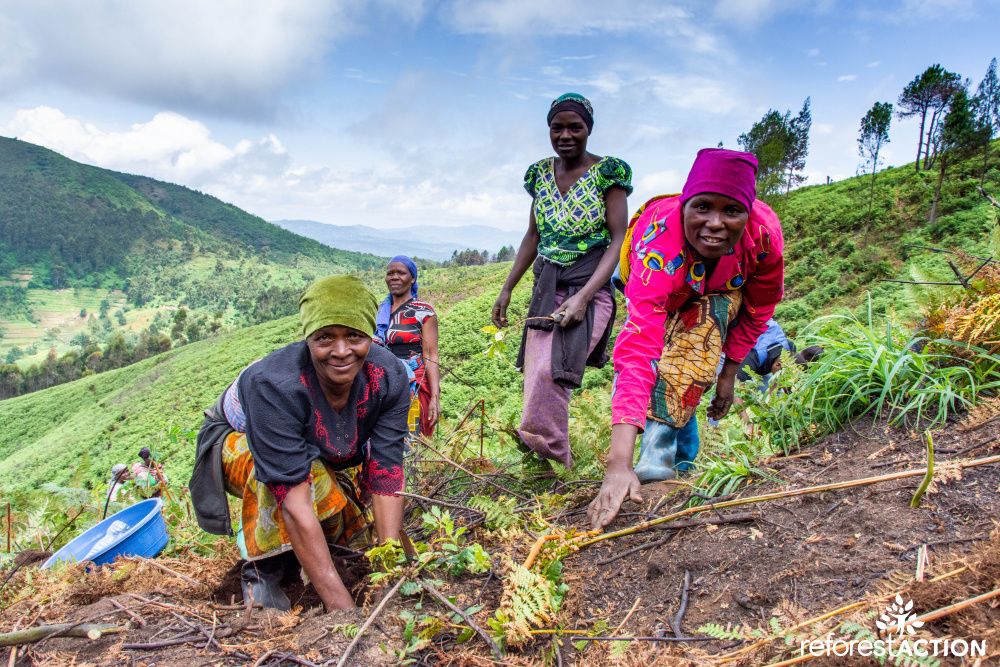
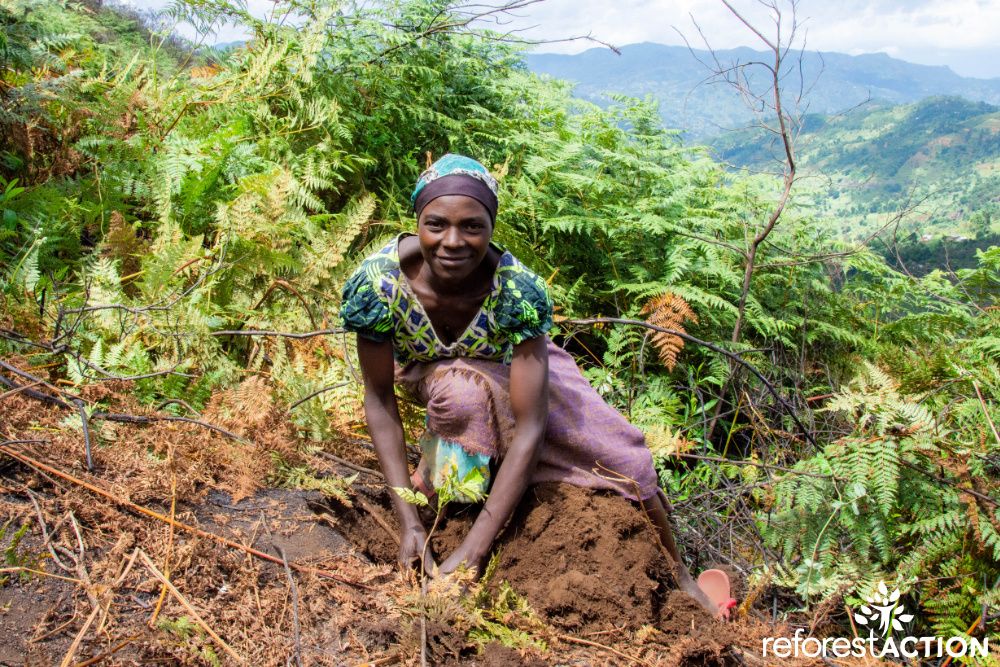
We too put our hand to the earth and add our tree to the edifice of this forest in the making, before sharing honey cakes with those who have become our working companions.
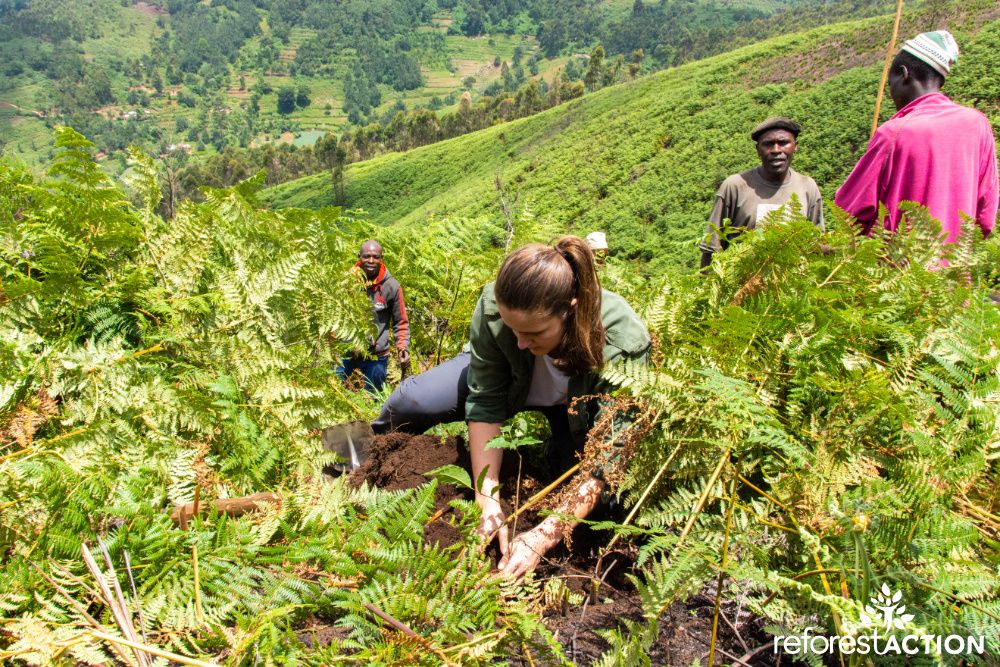
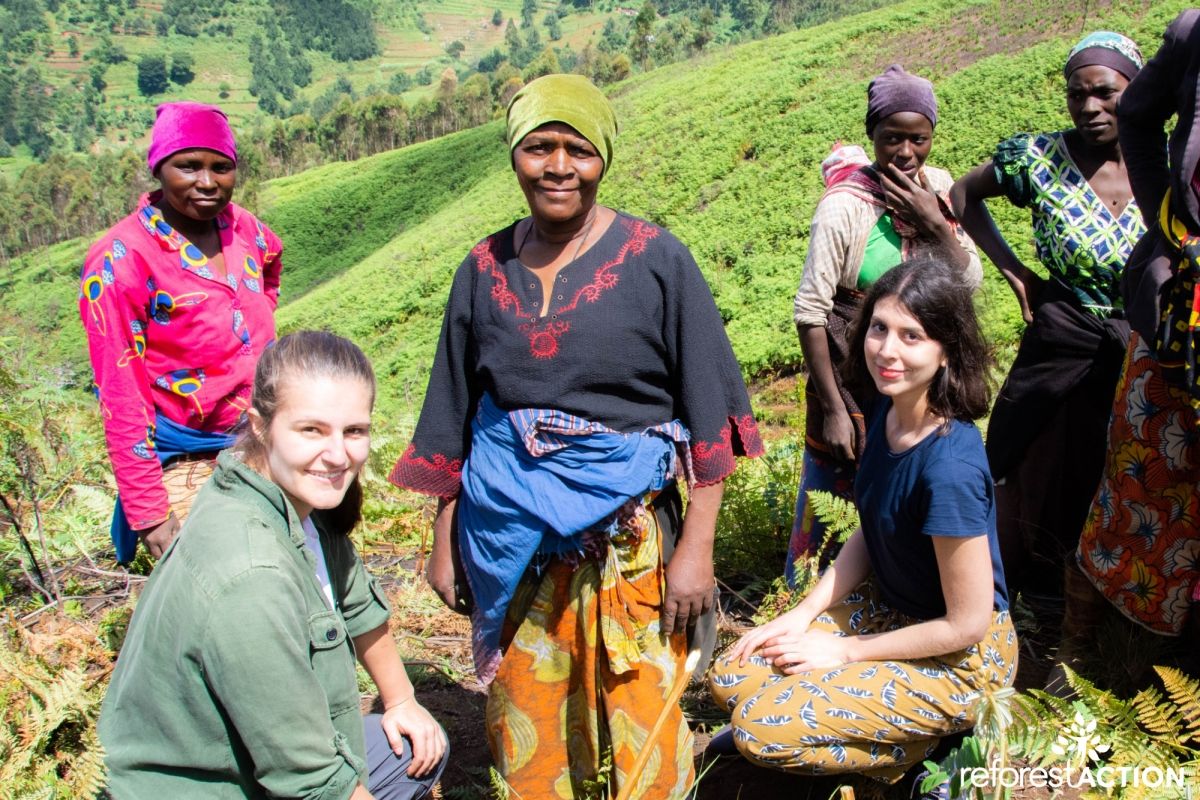
Discovering the relics of the primary forests
It is in the Mazumbai forest that our mission ends, where we discover a relic of the primary forests that populated the region hundred years ago. Discovered by a Swiss explorer and protected thanks to his joint efforts with those of the local university of Sokoine, the Mazumbai forest, which extends over 4200 hectares, is still today home to the very discreet Black Colobus monkeys, several hundred species of birds and a multitude of endemic species of trees and plants.
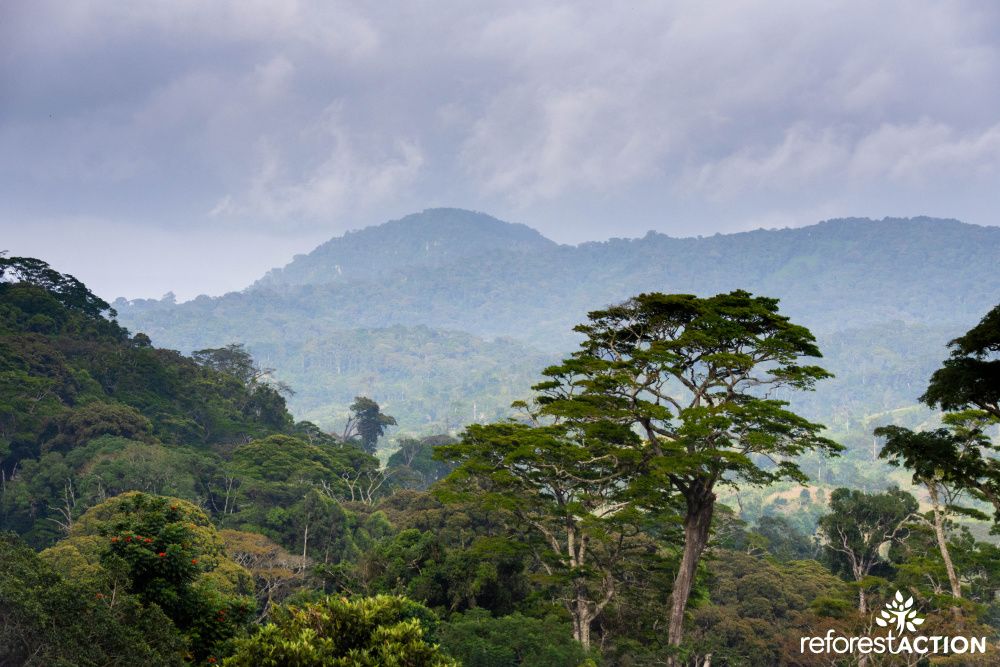
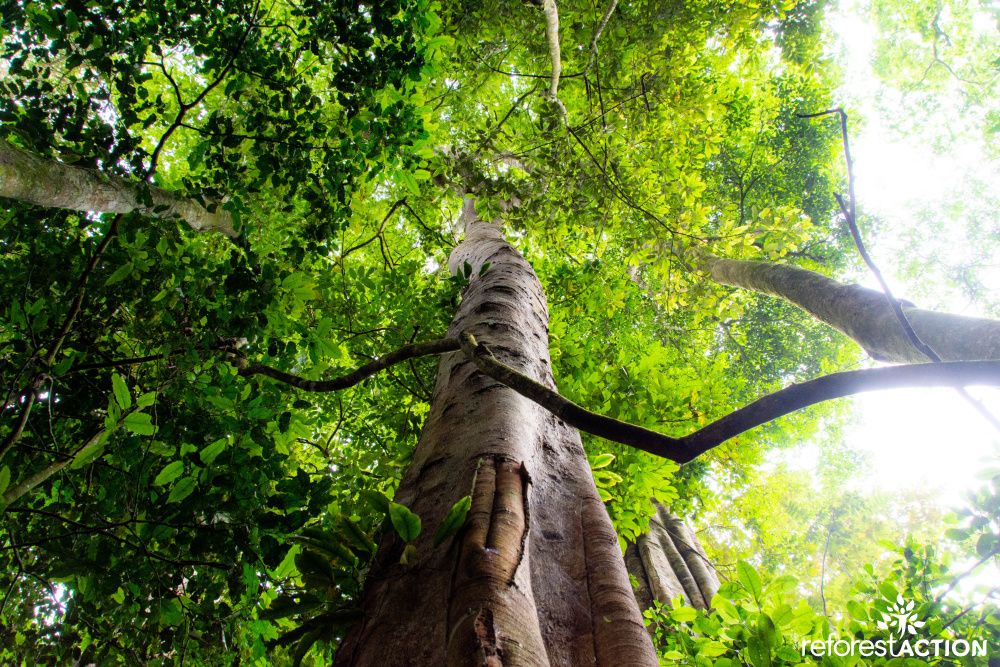
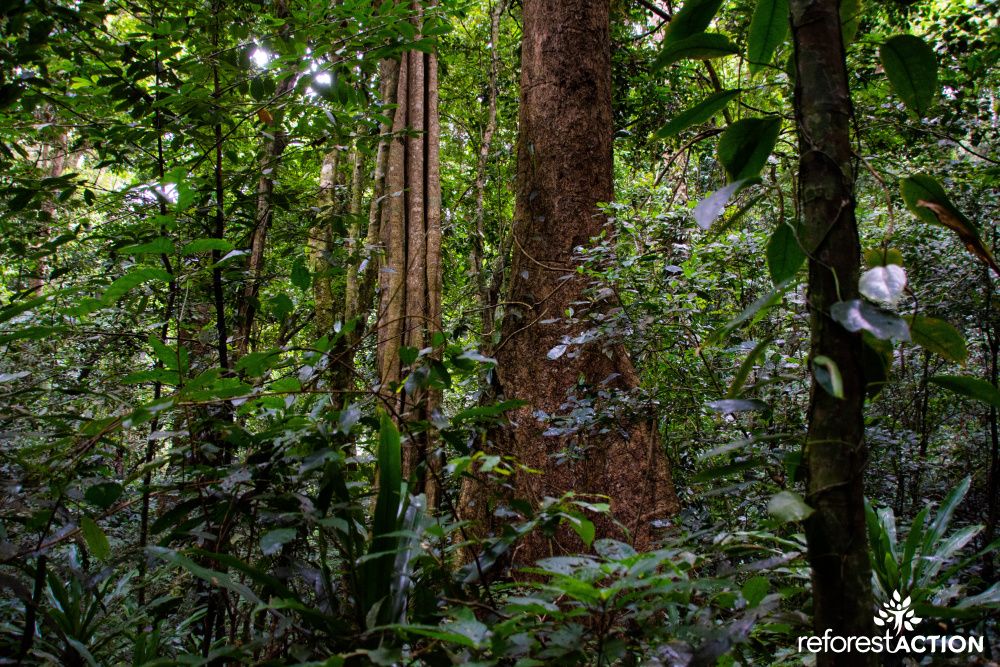
Alone in the forest, just before nightfall, we share a last moment of recollection in front of so much beauty, attentive to the murmur of the leaves and the birds, the song of the monkeys and the rustle of the streams.
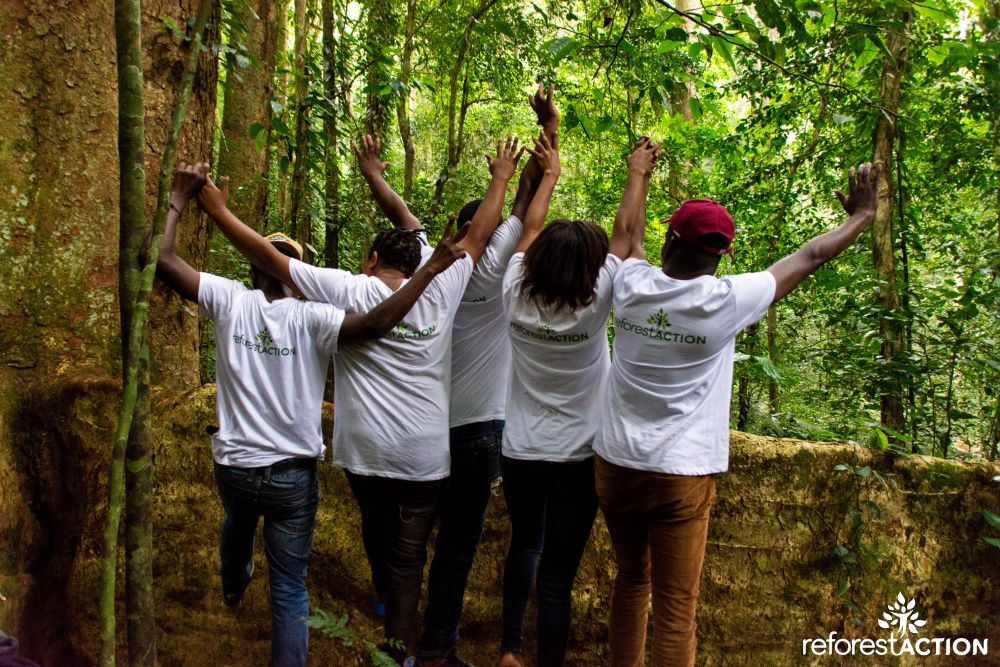
A good illustration of the synergy between our two teams, the Friends of Usambara wear t-shirts in the colours of Reforest'Action.
This week of audit and exchanges between Reforest'Action and Friends of Usambara ends here, in the middle of these forests that we are working, together, to preserve and restore.
Did you like this report? Share it on your social networks and help us plant even more trees in Tanzania! We are counting on you ;)